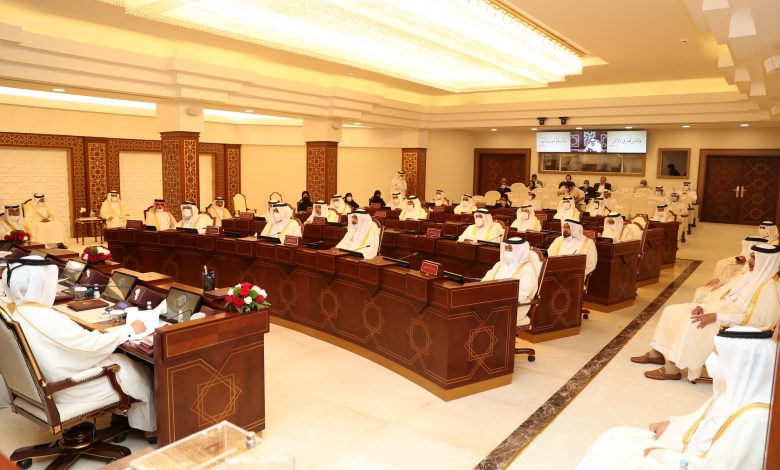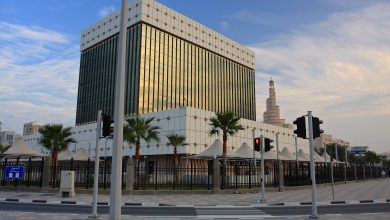
Shura Council makes recommendations on change of employer and expat worker’s exit
مجلس الشورى يقدم توصيات بشأن تحويل جهة العمل والسفر دون إخطار للعمالة الوافدة
QNA
Doha: The Shura Council held its regular weekly meeting on Monday under the chairmanship of HE Speaker of the Shura Council Ahmed bin Abdullah bin Zaid Al Mahmoud. The session was held via video conference technology at the Council headquarters.
At the outset of the session, the Council discussed a draft law amending some provisions of Law No. (4) of 2007 Enacting the Common System of Extending Insurance Protection to Citizens of the Cooperation Council of the Arab Gulf States working outside their countries in any member state of the council.
After discussion, the Council decided to refer the aforementioned draft law to the Legal and Legislative Affairs Committee for study and report on it to the Council.
During the session, the Council discussed the supplementary report of the joint committee of the Services and Public Utilities Committee and the Internal and External Affairs regarding the general discussion request submitted by several members of the council on the change of employer and travel without notification for expatriate workers.
After discussing the committee’s report, and based on the Shura Council’s keenness to support the efforts exerted by the government represented by the Ministry of Administrative Development, Labor and Social Affairs, and in order to develop the business sector in the State of Qatar, and after listening to the Council members views during the Council session held on Jan. 4, 2021 that was attended by HE Minister of Administrative Development, Labor and Social Affairs, as well as after providing their observations and proposals in the Council session held on Feb. 8, 2021, the Shura Council made a number of recommendations regarding the change of employer and travel without notification for expatriate workers, and decided to refer them to the esteemed government.
The recommendations called for ensuring the financial and legal status of the company to which the worker will move, especially in obtaining the approval for visa, and ensuring that the first party does not lose its visa. They also called for ensuing the number of times allowed to change the employer does not exceed three times during the worker’s stay in the country in order to prove his seriousness at work, in addition to ensuring that the percentage of workers who received approval to change employer does not exceed (15%) annually for a single company except with the approval of the employer. When recruiting workers to implement governmental or quasi-governmental contracts, it should be taken into account that they should not be granted change of employer except with the consent of the employer until the term of those contracts expires and that the visa should be linked to the contract. They also called for fair compensation for the costs the company spent on the worker.
In its recommendations, the Shura Council called for addressing the phenomenon of illegal workers by setting the appropriate mechanism and amending their conditions in accordance with the law. It also demanded to provide adequate procedures that amending the status of the worker whose transfer request has not been accepted in case that the original employer expresses his unwillingness for the worker to return to work for him. The Ministry of the Interior should set up the appropriate mechanism so that the worker’s employer is notified three days before the date of his departure by text message or via the Metrash application.
The recommendations also included an emphasis on determining the period of the contract signed by the employer and the worker, and that the worker is prohibited from requesting a change of the employer during the contract period, which should not exceed two years, unless there are reasons justifying this or with the approval of his employer. The recommendations also included increasing the percentage of workers who are not allowed to travel without permission from the employer from 5% to 10%, as there are small and medium enterprises and companies with very limited numbers in them.
The Shura Council also recommended to establish a permanent committee at the Ministry of Administrative Development, Labor and Social Affairs to decide on all applications for the sponsorship transfer, provided that the committee has in its membership a representative from the Chamber of Commerce and the Ministry of Interior, in order to consider requests for the sponsorship transfer and their compliance with the specified controls, conditions and mechanisms.
At the end of the session, HE the Speaker of the Shura Council briefed the Council on his participation last Monday in the meeting of the Special Committee on Counter Terrorism of the Parliamentary Assembly of the Mediterranean (PAM) which was held virtually at the invitation of the Assembly.
HE stated that the meeting, which was attended by the member of the PAM Dahlan bin Jamaan Al Hamad, discussed supporting the international and regional cooperation in combating terrorism, the role of parliamentarians in that, and how to confront the existing challenges in this field.
HE also briefed the Council on his participation, as the chairman of the Global Organization of Parliamentarians Against Corruption (GOPAC), at the annual joint hearing between the United Nations and the Inter-Parliamentary Union, which was held last Wednesday via video conferencing and devoted this year to discuss the issue of corruption and ways to combat it. He explained that the session discussed, with the participation of a number of Excellencies members of the Shura Council, several issues related to combating corruption, foremost among them is the impact of the 2005 UN Convention against Corruption and how to implement it effectively and ensure that emergencies, including pandemics, do not hinder anti-corruption efforts. It also discussed a proposal to establish an international anti-corruption court or another mechanism to prosecute corrupt persons who may escape justice in their countries.
قنا
الدوحة: عقد مجلس الشورى جلسته الأسبوعية العادية الأمس، برئاسة سعادة السيد أحمد بن عبد الله بن زيد آل محمود رئيس المجلس، وذلك عبر تقنية الاتصال المرئي بمقر المجلس.
وناقش المجلس في بداية جلسته، مشروع قانون بتعديل بعض أحكام القانون رقم (4) لسنة 2007 ، بإصدار النظام الموحد لمد الحماية التأمينية لمواطني دول مجلس التعاون لدول الخليج العربية العاملين في غير دولهم في أي دولة عضو في المجلس.
وبعد المناقشة قرر المجلس إحالة مشروع القانون المذكور إلى لجنة الشؤون القانونية والتشريعية لدراسته وتقديم تقرير بشأنه إلى المجلس.
وواصل المجلس جلسته، حيث ناقش التقرير التكميلي للجنة المشتركة المشكلة من لجنة الخدمات والمرافق العامة ولجنة الشؤون الداخلية والخارجية، بشأن طلب المناقشة العامة المقدم من عدد من أعضاء المجلس حول تحويل العمالة الوافدة لجهة العمل والسفر دون إخطار صاحب العمل.
وبعد مناقشة تقرير اللجنة، وانطلاقاً من حرص مجلس الشورى على دعم الجهود المبذولة والآثار المرجوة من قبل الحكومة ممثلةً في وزارة التنمية الإدارية والعمل والشؤون الاجتماعية، وفي سبيل تطوير وإنماء قطاع الأعمال بدولة قطر، وبعد الاستماع إلى وجهات نظر أعضاء المجلس أثناء حضور سعادة وزير التنمية الإدارية والعمل والشؤون الاجتماعية جلسة المجلس المنعقدة بتاريخ 4/1/2021 ، وملاحظاتهم ومقترحاتهم في جلسته بتاريخ 8/2/2021، توصل مجلس الشورى إلى عدد من التوصيات بشأن تحويل جهة العمل والسفر دون إخطار للعمالة الوافدة، وقرر إحالتها إلى الحكومة الموقرة.
ودعت التوصيات إلى التأكد من الوضع المالي والقانوني للشركة التي سينتقل إليها العامل وبالأخص حصولها على موافقة التأشيرة بشرط عدم خسارة الجهة الأولى لتأشيرتها، وألا تتجاوز عدد مرات تغيير جهة العمل ثلاثة مرات أثناء فترة وجود العامل في البلاد، وذلك لإثبات جديته في العمل، وألا تزيد نسبة العمالة الذين تتم الموافقة على تغيير جهة عملهم عن نسبة (15%) سنوياً وذلك بالنسبة للشركة الواحدة إلا بموافقة جهة عمله. وعند استقدام عمالة لتنفيذ عقود حكومية أو شبه حكومية يُراعى عدم الموافقة على نقلهم إلا بموافقة صاحب العمل حتى تنتهي مدة تلك العقود، وأن تكون التأشيرة مرتبطة بالعقد. كما دعت للتعويض العادل للتكاليف التي صرفتها الشركة على العامل.
وطالب مجلس الشورى في توصياته بمعالجة ظاهرة العمالة السائبة بوضع الآلية المناسبة وتعديل أوضاعهم وفقاً للقانون. كما طالب بوضع الإجراءات الكفيلة التي تعمل على تعديل وضع العامل الذي لم يتم قبول طلب انتقاله في حال إبداء صاحب العمل الأصلي عدم رغبته في رجوع العامل للعمل لديه. وأن تقوم وزارة الداخلية بوضع الآلية المناسبة كي يتم إشعار جهة عمل العامل قبل تاريخ سفره بثلاثة أيام برسالة نصية أو عن طريق تطبيق /مطراش/.
وتضمنت التوصيات كذلك، التأكيد على تحديد مدة العقد المبرم بين صاحب العمل والعامل، وأن يحظر على العامل أن يطلب تغيير جهة العمل أثناء مدة العقد التي يجب ألا تتجاوز سنتين، مالم تكن هناك أسباب تبرر ذلك أو بموافقة جهة عمله. وزيادة نسبة العاملين الذين يحق لجهة العمل عدم السماح لهم بالسفر بدون إذن من نسبة (5%) إلى (10%)، وذلك نظراً لوجود مؤسسات وشركات صغيرة ومتوسطة والعدد فيها محدود جداً.
كما أوصى مجلس الشورى بإنشاء لجنة دائمة في وزارة التنمية الإدارية والعمل والشؤون الاجتماعية تختص بالبت في كافة طلبات نقل الكفالة، على أن تضم اللجنة في عضويتها ممثلا من غرفة التجارة ووزارة الداخلية وذلك للنظر في طلبات نقل الكفالة ومطابقتها للضوابط والشروط والآليات المحددة.
وفي ختام الجلسة أطلع سعادة رئيس مجلس الشورى المجلس على مشاركته يوم الإثنين الماضي في اجتماع اللجنة الخاصة بمكافحة الإرهاب التابعة للجمعية البرلمانية للبحر الأبيض المتوسط، عبر تقنية الاتصال المرئي، وذلك تلبية لدعوة من الجمعية.
وأوضح سعادته أن الاجتماع الذي شارك فيه كذلك سعادة السيد دحلان بن جمعان الحمد عضو مجلس الشورى وعضو الجمعية البرلمانية للبحر الأبيض المتوسط، قد ناقش دعم التعاون الدولي والإقليمي في مكافحة الإرهاب ودور البرلمانيين في ذلك، وكيفية مواجهة التحديات القائمة في هذا المجال.
كما أطلع سعادته المجلس على مشاركته، وباعتباره رئيسا للمنظمة العالمية للبرلمانيين ضد الفساد، في جلسة الاستماع السنوية المشتركة بين الأمم المتحدة والاتحاد البرلماني الدولي، التي عُقدت يوم الأربعاء الماضي عبر تقنية الاتصال المرئي، والتي تم تخصيصها هذا العام لمناقشة موضوع الفساد وسبل مكافحته، موضحا أن الجلسة قد ناقشت، وبمشاركة عدد من أصحاب السعادة أعضاء مجلس الشورى، عدة قضايا تتعلق بمكافحة الفساد في مقدمتها مدى التأثير الذي أحدثته اتفاقية الأمم المتحدة لمكافحة الفساد لعام 2005 ، وكيفية جعل تنفيذها أكثر فعالية والتأكد من أن حالات الطوارئ، بما في ذلك الأوبئة، لا تعرقل جهود مكافحة الفساد، كما ناقشت مقترحا لإنشاء محكمة دولية لمكافحة الفساد أو آلية أخرى لمحاكمة الفاسدين الذين قد يهربون من العدالة في بلدانهم.



